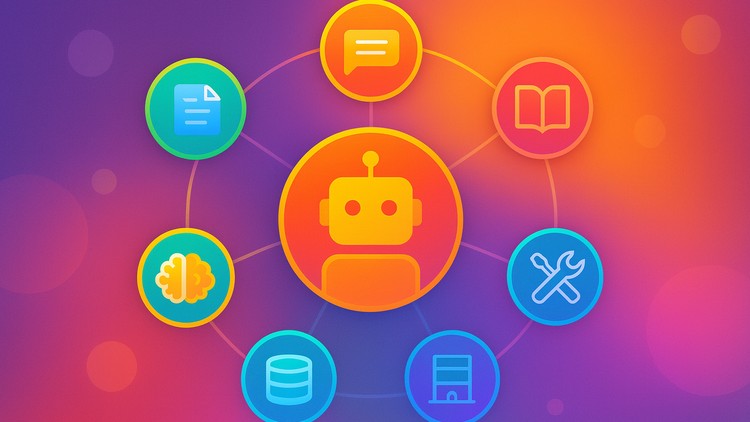
Learn how to design smarter, effective AI agents using the 6 essential context types: Instructions, Memory, Tools & more
⏱️ Length: 2.5 total hours
⭐ 4.14/5 rating
👥 16,345 students
🔄 August 2025 update
Add-On Information:
Note➛ Make sure your 𝐔𝐝𝐞𝐦𝐲 cart has only this course you're going to enroll it now, Remove all other courses from the 𝐔𝐝𝐞𝐦𝐲 cart before Enrolling!
-
Course Overview
- This intensive 2.5-hour course fundamentally redefines your approach to building intelligent AI agents. Moving beyond basic prompt engineering, it meticulously unpacks the critical role of context design in shaping an AI’s performance, reliability, and overall intelligence. You’ll discover how strategically constructed contextual inputs form the foundational blueprint for an AI agent’s ability to understand, reason, and act effectively in dynamic environments. The curriculum systematically addresses how AI agents can leverage various forms of information—from explicit directives to adaptive memory systems and external tool integrations—demonstrating their synergistic application to transform an ordinary AI into an extraordinary problem-solver.
- Embark on a journey to unlock the full potential of large language models by mastering the art of creating a rich, adaptive operational environment for them. This course equips developers, data scientists, and AI enthusiasts with advanced methodologies to architect agents exhibiting enhanced comprehension, maintaining state across complex interactions, and seamlessly interacting with the outside world. It’s about transitioning from reactive prompting to proactive, intelligent agent design, empowering you to build AI solutions that are not just smart, but truly strategic in execution.
- By focusing on structured context engineering, you will learn to mitigate common pitfalls like AI hallucination, context window limitations, and an agent’s inability to persist information or utilize real-world data effectively. This course emphasizes practical application, guiding you through principles for creating AI agents capable of sustained reasoning, adaptive behavior, and robust interaction across diverse use cases.
-
Requirements / Prerequisites
- Foundational Understanding of AI: A basic grasp of artificial intelligence, machine learning principles, and conceptual LLM operation is beneficial.
- Familiarity with Basic Prompting: Prior exposure to crafting simple LLM prompts will enhance appreciation for the advanced techniques.
- Desire for Advanced AI Development: A strong interest in moving beyond basic AI interactions to design sophisticated, high-performing AI agents is essential.
- Access to LLM Playground/API (Recommended): While theoretical, an environment for experimenting with LLM APIs (e.g., OpenAI, Google Gemini) will allow for hands-on reinforcement. No specific programming expertise is required for the course content itself.
- Problem-Solving Mindset: An analytical approach and readiness to think critically about AI agent interactions and information processing will significantly enhance learning.
-
Skills Covered / Tools Used
- Skills Covered:
- Advanced Agent Orchestration: Coordinate multiple contextual elements to guide complex AI behavior, facilitating multi-faceted agent workflows.
- Strategic Information Gating: Master techniques to selectively provide and update information to AI agents, ensuring relevance and preventing context overload.
- Behavioral Conditioning of AI: Instill specific operational guidelines and behavioral constraints, enabling adherence to predefined roles and objectives.
- External Resource Integration: Acquire expertise in enabling AI agents to interact with external databases, web services, and custom functions.
- Adaptive Reasoning Architecture: Design AI systems that learn from past interactions and adapt responses based on accumulated knowledge and evolving scenarios.
- Debugging Agent Failures: Cultivate a systematic approach to identifying and resolving issues in complex AI agent interactions for optimized reliability.
- Ethical Contextualization: Understand how context design influences an AI agent’s ethical boundaries and embed safeguards against undesirable outputs.
- Complex Task Decomposition for AI: Gain proficiency in breaking down intricate problems into manageable steps using rich contextual inputs.
- Tools Used (Conceptual/Frameworks):
- Large Language Model (LLM) APIs/Platforms: Conceptually leverages various LLM providers (e.g., OpenAI, Google Gemini) as the core engine, focusing on optimization through context.
- Agent Architecture Frameworks: Discussion of conceptual models and best practices for structuring intelligent agents.
- Knowledge Base Integration Patterns: Exploring design patterns for connecting AI agents to structured and unstructured external knowledge sources.
- Skills Covered:
-
Benefits / Outcomes
- Architect Robust AI Agents: Design and deploy AI agents that are resilient, error-resistant, and capable of handling complex, real-world tasks with greater accuracy.
- Boost AI Performance & Reliability: Significantly improve output quality and consistency by providing precisely tailored and dynamically updated operational contexts.
- Enable Multi-Turn, Stateful Interactions: Develop AI agents that maintain coherence and understanding across extended conversations or multi-step processes.
- Seamless External Integration: Empower AI agents to go beyond internal knowledge, connecting them to real-time data, business logic, and external APIs.
- Master Advanced AI Development: Elevate your skill set from basic prompt engineering to sophisticated AI agent architecture.
- Solve Complex Business Challenges: Apply advanced context design to create innovative AI solutions that automate workflows and enhance decision-making.
- Future-Proof Your AI Skills: Acquire timeless principles of AI agent design, ensuring your expertise remains relevant with evolving AI technologies.
- Reduce Development Iterations: Effectively structuring context from the outset minimizes trial-and-error, leading to more efficient development and quicker deployment.
-
PROS
- Highly Actionable and Practical: Delivers immediate, implementable strategies for enhancing AI agent capabilities.
- Fills a Critical Skill Gap: Addresses advanced techniques beyond basic prompting for building truly intelligent agents.
- Systematic and Structured Approach: Provides a clear framework for understanding and applying complex context design principles.
- Enhances Agent Autonomy and Effectiveness: Directly contributes to building more self-sufficient, capable, and reliable AI agents.
- Relevant Across Industries: Principles taught are universally applicable for deploying sophisticated AI solutions.
-
CONS
- Requires Independent Practice for Mastery: The condensed nature of the course necessitates significant self-driven practice and experimentation to fully internalize and master the advanced techniques discussed.
Learning Tracks: English,Development,Data Science
Found It Free? Share It Fast!